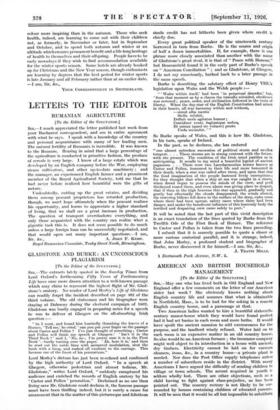GLADSTONE AND BURKE : AN UNCONSCIOUS PLAGIARISM [To the Editor
of the SPECTATOR.] Sm,—The extracts lately quoted in the Sunday Times from Lord Oxford's forthcoming Fifty Years of Parliamentary Life have once more drawn attention to a well-known passage Which may claim to represent the highest flight of Mr. Glad- stone's oratory. No reader of Lord Morley's Life of Gladstone can readily forget the incident described on page 492 of the third volume. The old statesman and his biographer were Staying at Dalmeny during the electoral campaign of 1892.
Gladstone was busily engaged in preparing notes for a speech he was to deliver at Glasgow on the all-absorbing Irish question :-
" In I went, and found him hurriedly thumbing the leaves of a Horace, Tell me,' he cried, can you put your finger on the passage about Castor and Pollux ? I've just thought of something ; Castor and Pollux will finish my speech at Glasgow.' - Isn't it in the Third Book.? ' said I, No, no ; I'm pretty sure it is in the First Book '—busily turning over the pages. Ah, here it is,' and then ho read out the noble lines with animated modulation, shut the book with a bang, and rushed off exultant to the carriage. This became one of the finest of his perorations."
Lord Morley's dictum has just been re-echoed and confirmed by the high authority of Lord Oxford. " In a speech at Glasgow, otherwise pedestrian and almost tedious, Mr. Gladstone," writes Lord Oxford, " suddenly enraptured his audience and enriched the records of English oratory by his ` Castor and Pollux ' peroration." Declaimed as no one then living save Mr. Gladstone could declaim it, the famous passage must have been thrilling indeed, but it is surely a cause for amazement that in the matter of this picturesque and felicitous simile credit has not hitherto been given where credit is chiefly due.
Every great political speaker of the nineteenth century liorrowed in turn from Burke. He is the source and origin of half a dozen immortalities. If, for example, there is one
phrase more closely associated than another with the name of Gladstone's great rival, it is that of " Peace with Honour," but Beaconsfield found it in the early part of Burke's speech on " American Conciliation " ; and so Gladstone, at Glasgow, I do not say consciously, harked back to a later passage in the same speech.
Burke is describing the salutary effect of Henry VIII.'s legislation upon Wales and the Welsh people :-
" ` Wales within itself,' had been in perpetual disorder,' but,
' from that moment as by a charm the tumults subsided, obedience was restored ; peace, order, and civilization followed in the train of liberty. When the day-star of the English Constitution had arisen in their hearts, all was harmony within and without, --simul alba nautis Stella refulsit, Defluit reads agitatus humor ; Concidunt venti, fugiuntque nubes, Et minas (quod sic voluere) ponto Uncle recumbit. ' "
So Burke speaks of Wales, and this is how Mr. Gladstone, in his turn, speaks of Ireland.
In the past, so he declares, she has endured
" one almost unbroken succession of political storm and swollen tempest. . . . Those storms are in strong contrast with the future, with the present. The condition of the Irish mind justifies us in anticipating. It recalls to my mind a beautiful legend of ancient paganism. . . . There were two Lacedaemonian heroes known as Castor and Pollux, honoured in their life and more honoured in their death, when a star was called after them, and upon that star the fond imagination of the people fastened lively conceptions ; for they thought that when a ship at sea was caught in a storm, when dread began to possess the minds of the crew, and peril thickened round them, and even alarm was giving place to despair, that if then in the high heavens this star appeared, gradually and gently but effectually the clouds disappeared, the winds abated, the towering billows fell down to the surface of the deep, calm came where there had been uproar, safety came where there had been danger, and under the beneficent influence of this heavenly body the terrified and despairing crew came safely to port."
It will be noted that the last part of this vivid description is an exact translation of the lines quoted by Burke from the Twelfth Ode of the First Book of Horace. The reference to Castor and Pollux is taken from the two lines preceding.
I submit that it is scarcely possible to quote a closer or more curious oratorical parallel, and it is strange, indeed, that John Morley, a profound student and biographer of Burke, never discovered it for himself.—I am, Sir, &c., 1 Dartmouth Park Avenue, N.W. 5.
J. TRAVIS MILLS.






































 Previous page
Previous page